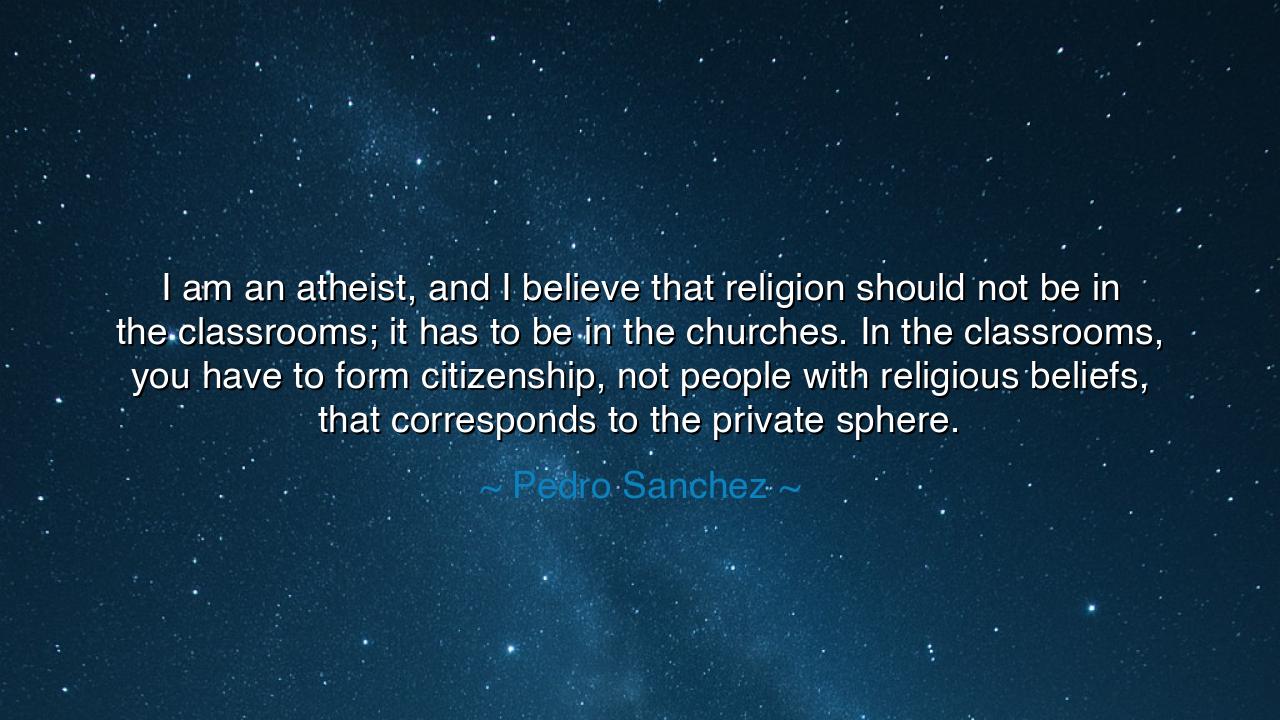
I am an atheist, and I believe that religion should not be in the
I am an atheist, and I believe that religion should not be in the classrooms; it has to be in the churches. In the classrooms, you have to form citizenship, not people with religious beliefs, that corresponds to the private sphere.






In the words of Pedro Sánchez, “I am an atheist, and I believe that religion should not be in the classrooms; it has to be in the churches. In the classrooms, you have to form citizenship, not people with religious beliefs, that corresponds to the private sphere.” These words are not spoken in rebellion, but in clarity — a call for distinction between the realms of faith and reason, between the sacred and the civic. Like the philosophers of old who sought harmony between the divine and the rational, Sánchez speaks to the soul of society: that education must be a temple of knowledge, not of dogma.
In the ancient world, thinkers such as Socrates, Plato, and Aristotle taught beneath open skies, believing that truth was found through questioning, not through decree. They were not opposed to the gods, but they believed that wisdom came from the human capacity to think freely. This, too, is the essence of Sánchez’s message: that the classroom should be a place where citizenship is forged — where the young are taught justice, compassion, and critical thought, not confined by inherited belief. The private sphere of the soul — the quiet garden where faith dwells — must not be replaced by a public altar demanding uniformity.
Consider the story of Hypatia of Alexandria, the brilliant philosopher and mathematician who taught in a city torn between faith and philosophy. Her classroom was open to all — pagans, Christians, and skeptics alike. She taught geometry and the movements of the heavens, urging her students to seek truth through reason. But her age could not yet separate the divine from the civic, and she was slain by those who believed that faith alone should rule knowledge. Her death stands as a warning carved in time: when religion invades the realm of learning, the light of reason flickers and fades.
Religion, noble as it may be, is the language of the heart, not the law of the land. It teaches comfort, purpose, and humility — gifts of great worth — but when it enters the classroom as authority, it ceases to be faith and becomes control. The classroom, by contrast, must be a forge of minds, where questions are sharper than swords and ideas are tempered by discussion. It is there that citizenship is born — citizens who can think, debate, and discern truth from illusion. To mix faith and public instruction is to blur the line between the inner and outer worlds, to confuse what is eternal with what is temporal.
In every civilization, there comes a moment when the people must decide what kind of wisdom they will pass down. Will they give their children answers that cannot be questioned, or questions that lead to new answers? The strength of a nation lies not in the uniformity of its beliefs but in the freedom of its minds. To teach religion in churches is to honor its sanctity; to teach citizenship in schools is to protect the harmony of society. Both are sacred, but each belongs to its own sphere.
Let us, then, walk the path of balance. Let the church nurture faith, and let the school nurture freedom. Let children learn to love both — the inner silence of prayer and the outer power of reason — without confusion between them. The wise teacher shows not what to think, but how to think. And the wise believer knows that faith, when freely chosen, shines brighter than when it is imposed.
The lesson, dear listener, is clear: guard the sanctity of education. Defend the right of every mind to grow without chains. And if you are a parent, a teacher, or a student, remember — your classroom is a sanctuary of thought. Fill it with curiosity, with courage, with compassion. For in doing so, you honor both reason and faith — each in their rightful place — and build a world where wisdom walks hand in hand with freedom.






AAdministratorAdministrator
Welcome, honored guests. Please leave a comment, we will respond soon